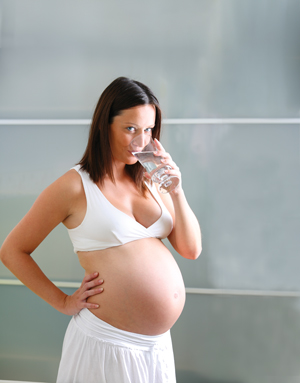Liquid assets
We all know that drinking water is a good idea, […]
We all know that drinking water is a good idea, but most of us don’t follow the “8×8 rule” religiously. When you find yourself expecting though, it’s time to start slurping —staying hydrated is a matter of utmost importance.
Invest in the best
While you’re pregnant, the minimum water requirement is still 8 to 10 ounces eight times a day. But according to Jackie Keller, celebrity nutritionist and founder of L.A.’s NutriFit, 10 glasses is really the ideal amount to keep in mind. Says Keller, “Our hormones change when we’re pregnant, and that change affects our water retention. Couple that with an increase in blood volume and the amniotic fluid the body is replacing constantly, and we just have the need for more water.”
When you’re getting your 8 to 10, you will enjoy moister skin, smoother lips, increased energy and better digestion. Drinking plenty of water can relieve constipation (a common complaint during pregnancy) and take some pressure off your hardworking kidneys. Water also helps to ward off toxemia and even prevent preterm labor. Worried about water retention (and those frightful pregnancy cankles)? Never fear: The water you drink flushes through your system and actually causes you to retain less. In fact, there really isn’t any downside to drinking water. Keller insists, “It’s unlikely that a pregnant mom is going to [consume] too much water. Unless you’re drinking more than 16 glasses a day, chances are you’re not getting too much.”
Because it’s tough to go from 0 to 64 ounces in a day, don’t feel bad if you need to work up to it. Good nutrition is all about forming habits, so commit yourself now to get up to 10 glasses (or at least eight) each day, and keep it up through your prenatal and breastfeeding days. With all those benefits inside and out, you’re bound to be pleased with the results.
Diversify your portfolio
There’s no replacement for good old H2O, but some other beverages make excellent dietary additions. Keep your fridge stocked with milk, and consider adding fruit juices and green tea to the tally as well.Two to four servings of dairy are requisite each day, and it’s a good idea to stay on the high end of that range during pregnancy. If you’re a milk drinker, choose the fat-free variety. While you do need some fat in your diet, it’s better attained from unsaturated fat sources such as avocados, nuts and extra virgin olive oil. Nonfat milk is the dairy choice with the lowest calorie count (about 90 per cup) and the highest nutritive value, so feel free to drink it up. If you don’t care for straight milk, cook your hot cereal in it or use it in healthy smoothies or milkshakes. Yogurt, cheese and cottage cheese are also good sources of dairy—they all contain the calcium that’s essential as baby’s skeletal structure is forming.
Fruit juice is another acceptable fluid for pregnant gals. However, according to Keller, fruit contains fiber, gum and pectin in greater quantities before it’s juiced, so when given the choice, opt for whole fruits instead. When you do decide to drink your fruit servings, look for 100 percent juice and pick a dark purple option. Pomegranate, grape and blueberry juices contain antioxidant flavonoids which provide valuable phytochemical benefits, including reduced risk of heart disease and cancer.
Keller also recommends picking up a green tea habit during pregnancy. Drinking one to two cups of decaffeinated green tea each day supplies your body with wonderful antioxidants and nutritional perks. Find a flavor you love—it’s OK to get hooked!
Lose liabilities
If water brings the greatest rewards during pregnancy, then alcohol wreaks the greatest havoc, so stay away from it. Besides this obvious no-no, artificially sweetened and highly caffeinated drinks populate the group often considered off-limits for pregnant women. Since we don’t have much information on their long-term effects, artificial sweeteners such as aspartame (NutraSweet), saccharin (Sweet’N Low) and sucralose (Splenda) are best avoided during pregnancy, just to be completely on the safe side. Instead, look for agave, a natural, unprocessed sugar substitute taken from plant nectar; it’s a safe choice that won’t raise your blood sugar. Pure sugar itself is not a dangerous substance, but too much can cause excessive weight gain that may lead to gestational diabetes.
For this reason, it’s a good idea to give up drinking soda while you’re expecting (if not forever!). Your teeth will thank you for it, and it will be easier to get in nutritious beverages when you’re not filling up on the sweet stuff.While there is some debate over the safety of caffeine consumption during pregnancy, most experts agree it should be limited. If cutting out coffee is shocking your system and causing headaches, Keller suggests switching to half-caf joe, then painlessly weaning yourself to full decaf, which you can enjoy throughout the remainder of your pregnancy. Remember to discuss caffeine usage with your doctor before you proceed.








